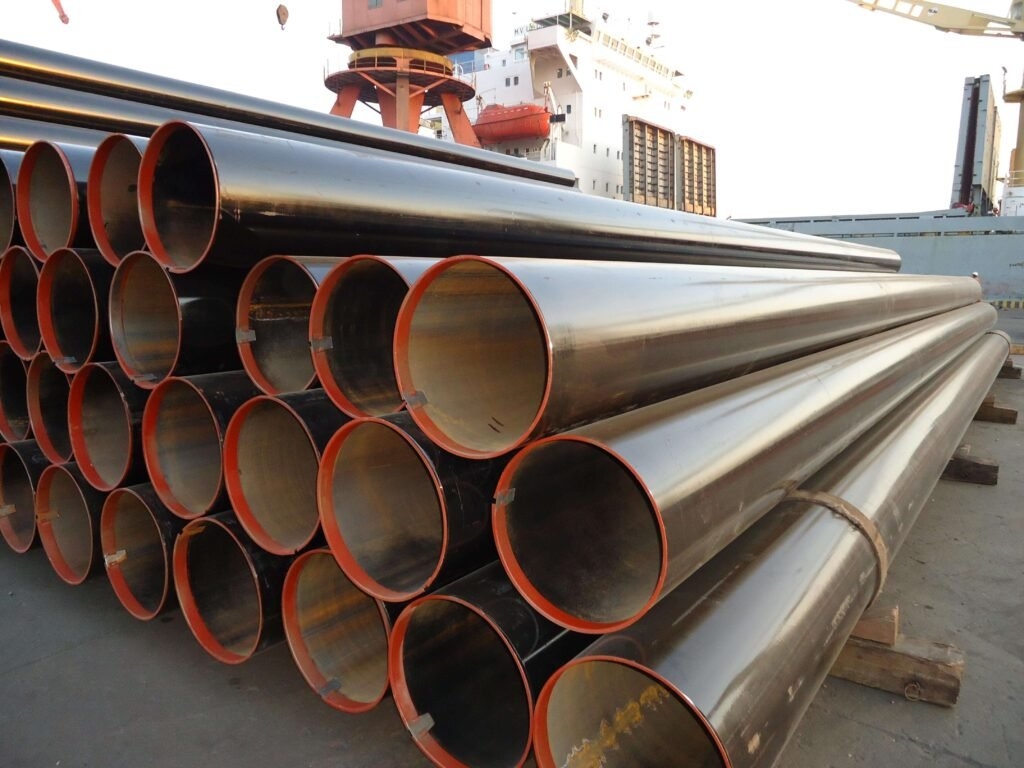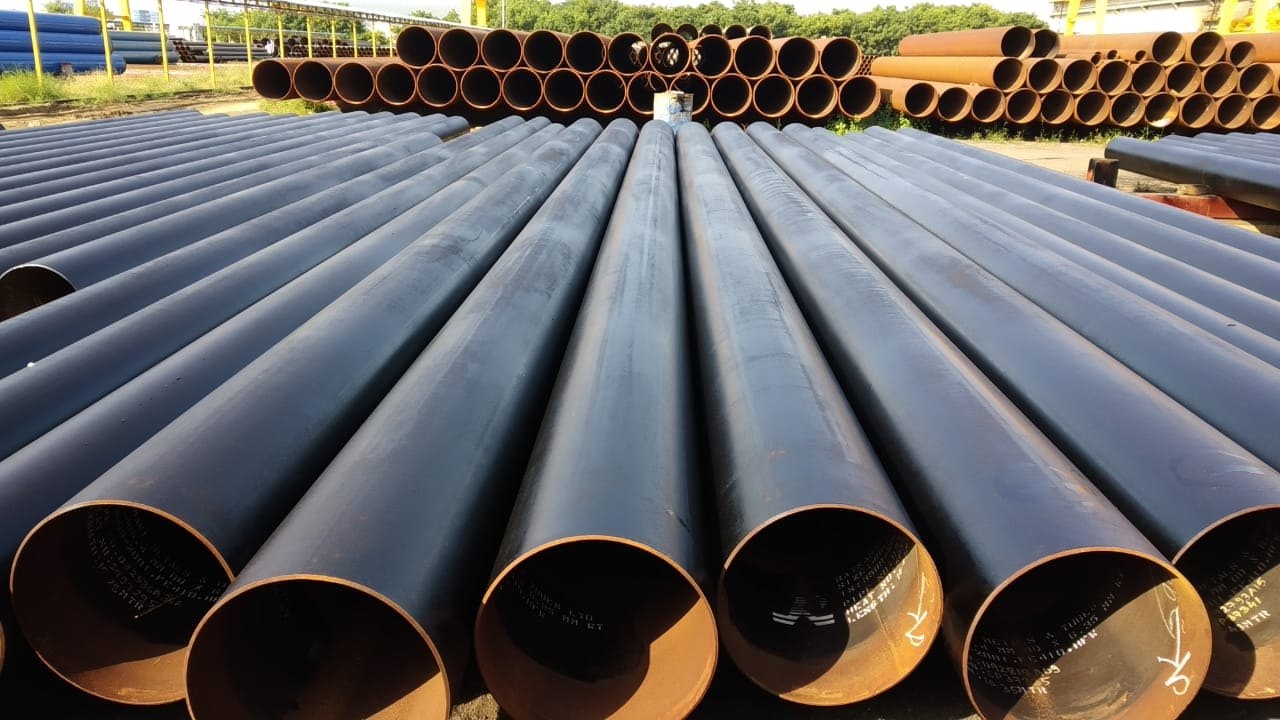Forged in Fire: The Craft of ERW Welded Steel Tubes
ERW Welded Steel Tubes, crafted through cold forming steel coil into cylindrical shapes, serve diverse engineering needs. Renowned for their affordability, robust weld seam security, and versatility in thickness and diameter, these tubes find crucial application across industries. Their significance spans from structural frameworks in construction to pipelines in energy sectors, facilitating efficient transportation of fluids and gases. In manufacturing, they provide the backbone for machinery and equipment, ensuring structural integrity and reliability. Additionally, in automotive and aerospace industries, their precision and durability contribute to safety and performance standards. The enduring popularity of ERW Welded Steel Tubes underscores their indispensable role in modern engineering endeavors across the globe.

The Manufacturing Process
Sourcing Raw Materials
- Variety of Steel: ERW Welded Steel Tubes are crafted from diverse steel types, including carbon, alloy, and stainless steel, chosen for specific applications and properties.
- Stringent Quality Control: Raw materials undergo meticulous sourcing to meet rigorous standards such as ASTM, EN, and JIS, ensuring uniformity and reliability in the final product.
Forming the Tube
- Initial Formation: The process initiates by shaping steel coils into cylindrical forms, laying the groundwork for the tube's structure.
- Welding Integrity: Utilizing electric resistance welding (ERW), the formed tube's edges are seamlessly fused, ensuring a robust, continuous seam along its length.
Precision Sizing and Shaping
- Dimensional Accuracy: Post-welding, meticulous sizing procedures ensure precise dimensions, maintaining consistency in diameter and thickness.
- Refinement Techniques: Employing various shaping methods like sizing rolls and stretch reduction, the tube's shape is perfected, enhancing its mechanical attributes.
Enhancing Mechanical Properties
- Annealing: Heat treatments, including annealing, alleviate internal stresses, enhancing the tube's ductility and toughness for improved performance and longevity.
- Tailored Strength: Quenching and tempering processes may be applied to further tailor the tube's mechanical properties, imparting specific hardness and strength characteristics.
Quality Control Measures
Rigorous Inspection Protocols
Diverse Testing Methods: Inspection techniques like hydrostatic, ultrasonic, eddy current, magnetic particle, impact, and hardness testing ensure the tube's structural integrity and quality.
Adherence to Industry Standards
Standard Compliance: Meeting industry benchmarks such as API 5L, ASTM A53, and BS1387 ensures ERW Welded Steel Tubes meet requisite specifications and performance criteria.
Ensuring Product Integrity
Critical Role: Quality control in ERW Welded Steel Tube production is pivotal, guaranteeing safety, reliability, and performance, vital for customer satisfaction and maintaining manufacturer credibility.
Comprehensive Quality Assurance
- In-house Testing Facilities: Our factory features an in-house experimental testing center, accredited with CNAS Laboratory Accreditation Certificate, facilitating comprehensive quality assessment.
- Stringent Production Oversight: Quality inspection occurs at various production stages, from fabrication to final inspection, ensuring adherence to rigorous standards and specifications.
- Certifications and External Validation: Holding internationally recognized certifications like ISO and CE, supported by third-party testing from agencies like SGS and BV, underscores the quality and reliability of our ERW Welded Steel Tubes.
Applications of ERW Welded Steel Tubes
Construction Industry
ERW Welded Steel Tubes play a critical role in the construction industry, providing structural support for buildings, bridges, and other infrastructure. These tubes ensure stability and safety due to their high strength-to-weight ratio, making them ideal for critical load-bearing applications. Additionally, they are widely used in plumbing and HVAC systems within buildings, favored for their corrosion resistance and durability, which guarantee the long-term functionality of these systems.
Automotive Industry
In the automotive industry, ERW Welded Steel Tubes are integral to manufacturing chassis components. Their robustness and resistance to deformation under stress contribute to the overall safety and longevity of vehicle structures. These tubes are also essential in the construction of exhaust systems, where their high-temperature resistance and malleability allow for effective emission control, crucial for meeting automotive regulatory standards.
Oil and Gas Industry
The oil and gas sector relies heavily on ERW Welded Steel Tubes for constructing extensive pipeline networks that transport oil and natural gas across great distances. These tubes' high tensile strength and weldability make them suitable for the demanding environments of pipeline applications. Furthermore, they are employed in drilling equipment, where their durability and precision are vital for the efficient and successful extraction of resources.
Advantages and Challenges
Advantages of ERW Welded Steel Tubes
ERW Welded Steel Tubes offer significant cost-effectiveness, stemming from their streamlined manufacturing process that enhances productivity and reduces material waste. Their versatility extends to various applications across different industries due to the availability of tubes in multiple sizes and specifications, catering to unique requirements and conditions.
Challenges in Production
Despite their advantages, the production of ERW Welded Steel Tubes faces challenges, particularly in maintaining weld integrity, which is crucial for ensuring the strength and durability of the tubes. Issues like weld defects or inconsistency can compromise tube quality. Additionally, achieving a high-quality surface finish can be challenging due to the nature of the welding and forming processes, requiring additional treatments to meet industry standards.
Future Trends and Innovations
Technological Advancements
The future of ERW Welded Steel Tube manufacturing looks promising with advancements in automation, which promise to enhance efficiency and consistency in production. Additionally, improved welding techniques are being developed to enhance the quality of welds, increasing the reliability and application range of these tubes. These advancements are poised to address current production challenges and open up new applications in various industries.
Sustainable Practices
Sustainability is becoming increasingly important in the manufacturing of ERW Welded Steel Tubes. Efforts are being focused on recycling and waste reduction, minimizing the environmental impact of production processes. Moreover, implementing energy-efficient practices not only reduces operational costs but also contributes to the industry's efforts to combat climate change, marking a step towards more sustainable manufacturing practices.
In Sum
ERW Welded Steel Tubes are indispensable components across a multitude of industries, including construction, automotive, and oil and gas. Their versatility, durability, and cost-effectiveness make them vital for structural support, fluid conveyance, and mechanical applications. While challenges in production, such as weld integrity and surface finish, exist, ongoing technological advancements promise to address these issues and enhance the quality and efficiency of ERW tube manufacturing. Furthermore, with a growing emphasis on sustainability, the industry is increasingly adopting eco-friendly practices to minimize environmental impact. As such, ERW Welded Steel Tubes remain at the forefront of innovation, poised to meet the evolving needs of diverse industries while paving the way towards a more sustainable future.






